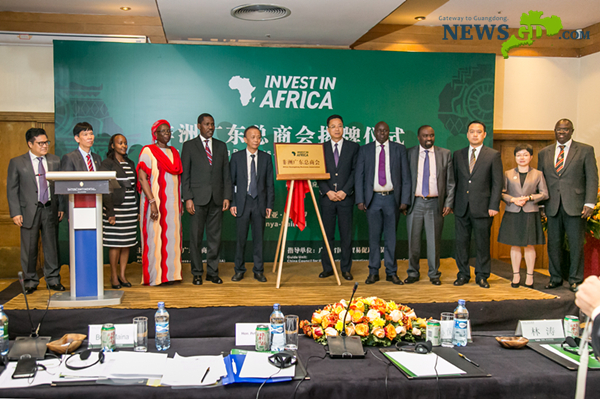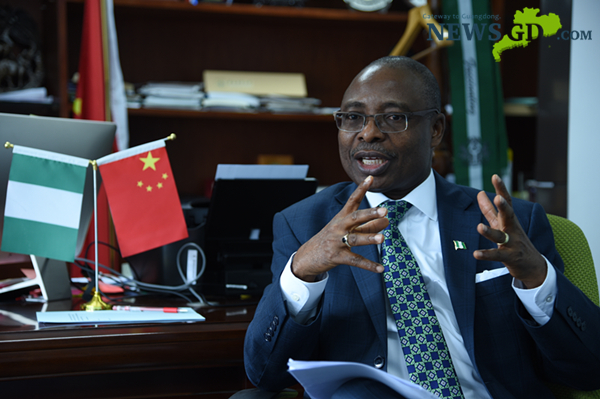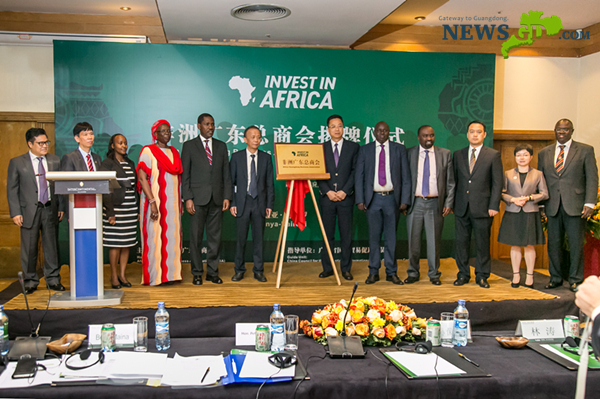“Wo Mai Dan, Sao Wo Wei Xin (Chinese pinyin, meaning ‘it's my treat, please scan my WeChat’)”, was the fluent Chinese spoken by GZ Expat BABY Aly Sidy at a café on Taojin Road, the heart of Guangzhou’s downtown area.
Aly comes from Mali, the second largest country in west Africa. Having been living in China for 8 years, he is working in the cross-border e-commerce business in Guangzhou and has established his own company here.

The Africa Guangdong Business Association (AGBA) was established in Nairobi, Capital of Kenya on Aug.3rd [Photo provided to Newsgd.com]
Meanwhile, in Nairobi, Capital of Kenya, the Africa Guangdong Business Association (AGBA) is gearing up for establishing an investment fund, which aims at facilitating sustainable development for Chinese and Cantonese enterprises in Africa. Tracy Huo, vice-chairman of AGBA, who has visited dozens of African countries over the past ten years, is now serving as a “bridge builder” for the China-Africa partnership.
The Forum on China-Africa Cooperation (FOCAC), which is to be convened in Beijing on September 3rd and 4th, will witness the beginning of a new chapter in China-Africa relations. Driven by the Belt and Road Initiative (BRI), Guangdong continues to foster economic and cultural cooperation with Africa. There are more and more “bridge builders” like Aly and Huo springing up.
Seeking “gold” and opportunities
Many newly-arrived African businessmen choose to settle in Taojin and Xiaobei, which is near Bao Han Zhi Street, one of the largest migrant communities in the city. This bustling street is a microcosm of the billion-dollar trade boom between African nations and China.

BABY Aly Sidy with his two kids [Photo/Steven, Newsgd.com]
During the first few days starting up his business in Guangzhou, Aly always went to Xiao Bei where many other Africans go to purchase goods. He helped them book hotels and call taxis because he spoke Chinese very well.
“They wanted to exchange contacts and make friends with me. They asked me if I could help them buy goods.” Consequently, Aly forged connections in the city.
Now, as e-commerce is booming in China, he prefers to use online channels more often as it takes much less time and it is more convenient. He showed us several cellphone apps, such as Taobao and 1688.
“These have been a great help to me,” he said with much delight, “I don’t even have to leave my office or house.”
Many Cantonese enterprises have also performed excellently by seizing the opportunities brought by BRI and drumming up business in Africa.
“On the basis of their complementary advantages, Chinese state-owned enterprises and private enterprises will promote infrastructure development and boost the economies in African countries”, said Liu Jisen, Deputy Secretary of Guangdong Institute for International Strategies.
Motivated by BRI, the cooperation between Guangdong and Africa has expanded across agriculture, tourism, education, finance and culture sectors.
According to Huo Dongming, the Head of DD Brother Group, “the deepening friendship between China and Africais attracting Cantonese enterprises to invest in more diverse areas.”
Since 2012, his corporation has invested in Tanzania, Malawi and Congo in precast concrete pipe infrastructure, networking and education charities. He thinks that Chinese enterprises should work on projects that will benefit African people so as to receive public support and lay a solid foundation for future cooperation.
Stronger cultural connections
The impressive growth of Guangdong-Africa trade and economic cooperation has acted as a catalyst for cultural integration, the both reinforcing each other.
Before coming to Guangzhou, Aly spent almost a year and a half in Wuhan, where he met a Chinese mom who treated him like a member of her own family.
“She introduced Chinese culture to me by taking me attend Chinese weddings and funerals.” It was then that Aly developed a great interest in Chinese culture and thought Mali’s culture was not so far different from that in China.
After studying Chinese in Wuhan, Aly came to Guangzhou and majored in business at Jinan University, where he got a deeper understanding of Chinese business culture and finally overcame the language barrier.
“Now, when going to the market, I want to make friends with the local suppliers. I’ve learned some phrases that make them smile.” Idioms such as ‘一分钱一分货 (you get what you pay for)’ have become his pet phrases.
The song "One for all and all for one"
Tabou, a Senegal singer is also fascinated by Chinese culture. “My mom, a businesswoman engaged in China-Africa trading, used to live here. She was the one who first invited me to come here 4 years ago.”
Now she has many Chinese friends and she has a Chinese name, Feifei. One of Tabou’s dreams is to have a chance to work with Chinese people more often, like working with Chinese producers, making an album together with Chinese artists if possible. She has tried to blend African music with Chinese and Cantonese culture and turn her experience in the city into a song.
In August this year, Tabou wrote and performed the song ‘One for all and all for one’ collaborating with Newsgd.com and Nanfang Daily to express her best wishes for China-Africa friendship.
“(Living) in Guangzhou, I have witnessed many people from my hometown come here for business and study. And I knew many people from Guangdong in Senegal as well. In future, my dreams include working in a movie that talks about Africans living in Guangzhou.”
This April, Tracy Huo initiated the first China-Africa Economic and Cultural Week in Guangzhou. By immersing themselves in a wide variety of activities including photography exhibitions, movie screenings, reading clubs and forums, Cantonese people were able to get a better understanding of Africa.
According to Huo, high priority should be given to cross-cultural talent cultivation and “based on this, AGBA has founded a commercial school in Africa and designed a core curriculum, in order to build a talent pool out there.”
Suggestions for China-Africa mutual prosperity
In accordance with figures released by Department of Commerce of Guangdong Province, in early 2017, Cantonese enterprises set up 29 branches in Africa and the number had increased to 244 by the end of last year. There are 10 African Consulates General in Guangzhou, outnumbering other Chinese cities in this regard.

Wale Oloko, Consul General of Nigeria in Guangzhou [Photo/Steven, Newsgd.com]
In terms of better investment in Africa, Wale Oloko, Consul General of Nigeria in Guangzhou, offers two pieces of advices to Guangdong investors:
1.Understand the African environment and understand the culture of people there, the investment laws, and how to enter an equal partnership, which is very very important.
2.It’s also key to understand the political system of the respective country, whether it’s democracy or governorship. It’s obviously better to not get involved in the internal political affairs of the country in question.
Please turn to the next page to read the Chinese version of the article
Author | Keane Wong, Hu Liangguang, Huang Xuhao, December Yu
Editor | Simon Haywood
Chief Editor | Wing Zhang, Wang Huiyun
Photo | Steven Yuen
粤非互利合作迭代升级
“一带一路”倡议带来广阔机遇,“民间使者”筑牢共赢之桥
“我买单,扫我的码。”在广州市淘金路一家咖啡馆里,非洲商人巴比·阿里正用流利的普通话与店员沟通,熟练地使用手机付款。
阿里来自西非面积第二大的国家马里共和国,已在中国生活了8年,成为了一名“中国通”。如今他在广州创办了自己的公司,从事跨境电商贸易。

在肯尼亚首都内罗毕,今年8月刚刚揭牌成立的非洲广东总商会紧锣密鼓地筹备设立投资基金,为中企、粤企在非洲的可持续发展护航。总商会的“80后”副会长霍江涛10余年间走过十几个非洲国家,目前已转型为中非合作的平台运营者与“桥梁搭建者”。
2018年中非合作论坛北京峰会将于9月3日至4日举行。这将是中国今年举办的规模最大、外国领导人出席最多的主场外交。中国和非洲历来是休戚与共的命运共同体,是合作共赢的利益共同体。随着“一带一路”倡议快速推进,作为中国与非洲经贸联系最密切、合作基础最扎实的省份之一,广东与非洲的经贸、人文交流合作不断迭代升级,像阿里、霍江涛一样在两地之间牵线搭桥的“民间使者”群体日益壮大,共同筑牢粤非互利合作的友谊之桥。
异国“淘金”
抢抓机遇开拓新蓝海
不少非洲生意人初到广东,都会选择在广州淘金、小北一带扎根。小北地铁站附近的宝汉直街更是广州最大的非洲人聚集地之一。非洲商人们在这里熙熙攘攘,成为一道独特的风景线,这也是粤非贸易热潮的一个缩影。
生意刚刚起步的时候,阿里常到小北附近寻找机会。因为中文说得不错,他就在这里帮一些非洲客商订酒店、叫的士。“他们往往会与我交换联系方式、成为朋友,有人还会问我能否帮他们采购。”就这样,勤奋、踏实的阿里慢慢建立起他在广州的人脉圈。
为了帮客户采购到合适商品,几年下来阿里的足迹几乎遍布整个珠三角地区——他会到广州大沙头选购小商品,到佛山买家具,偶尔还会到深圳批发电子产品。
得益于中国电商行业的迅速发展,阿里亲自外出采购的节奏才稍微慢下来。如今他更喜欢通过线上渠道选货进货,既方便又省事。
阿里向记者展示了几款经常使用的手机商务应用。“这些手机应用可帮了我大忙,现在我不用离开家里或办公室,躺在沙发上就能做生意。”阿里说。
在非洲商人涌入广东的同时,不少粤企精准把握“一带一路”发展机遇,主动拥抱非洲大陆,“走出去”开拓新蓝海。
“国有企业走在合作前列,支持非洲国家改善基础设施条件、发展经济。民营企业紧随其后,将触角延伸到非洲的各个角落,与国有企业形成互补。”广东国际战略研究院副秘书长、广东外语外贸大学非洲研究院副院长刘继森分析。
在“一带一路”快速推进的背景下,粤非合作加速迭代升级,合作领域从贸易、基建、能源、制造等扩大到农业、环保、旅游、教育、文化、科技、金融等行业,广度和深度协同并进。非洲的工业化进程亦成为广东省促进供给侧结构性改革的良好契机。
东丹投资总裁霍东明就是从广东走出去的企业家代表之一。“近年来中非友谊不断深化,非洲人民对中国人越来越友好。”霍东明说,这吸引了不少广东企业和商人选择投资非洲,投资领域更加多元。
从2010年开始,霍东明陆续在坦桑尼亚、马拉维、刚果金等国投资了预制混凝土管桩厂、网络覆盖工程等项目,同时也致力于推广技能教育慈善工作。
霍东明回忆,在非洲的投资并非一帆风顺。他分析道,非洲处于快速工业化的时期,市场广阔,但投资见效相对慢,企业需要做好准备。以混凝土电杆为例,有的非洲国家并不熟悉,一直用的是木质电杆,因此大范围推广需要一定时间。对于有的采用欧美标准的非洲国家,中国产品进入当地也有一定难度。
在他看来,中国企业到非洲投资,要做对当地政府和民众有益的项目,体现社会责任,比如完善公共基础设施、优化医疗服务等,这样可以更快提升企业在当地的认可度和美誉度,为未来深入合作打好基础。
心手相连
文化先行促民心相通
粤非经贸合作屡结硕果,为两地经济发展注入了新的血液,也成为文化深度融合的高效催化剂;民心相通也将为互利合作行稳致远提供不竭的原动力。
来广州之前,阿里在武汉待了一年半,一位热心的阿姨一直把他当家人一样对待。“她带我去参加中式婚礼和葬礼,让我接触到了中国文化。”这段经历也让阿里觉得,马里文化与中国文化差异没有想象的那么大。随后,阿里来到广州,在暨南大学主修商科,因此更深入地了解了中国的经商之道。
“现在我会想着如何与广州的供应商做朋友,我知道说什么能让他们高兴。”阿里说,像“一分钱一分货”这样的俗语、方言已成为他的口头禅。
塞内加尔女歌手塔布也同样在广州发现了中国文化的迷人之处。塔布的母亲在广州做生意,4年前,为了给母亲帮忙,塔布来到了广州,并开始学习中文。这4年间,她交了不少中国朋友,还取了一个中文名“菲菲”。
菲菲告诉记者,她有一个“音乐梦”,希望可以和广州本土音乐人共同录制专辑。在菲菲以往的音乐作品中,不乏将非洲音乐元素与中国、广东文化进行混搭的尝试。有时她也会将在广州的生活经历写进歌里。
在中非合作论坛北京峰会即将举办之际,她结合自己在广州的经历,与南方英文网、南方日报海外版共同谱写并演唱了一曲反映中非友谊的歌曲。
“在广州,我看到了很多故乡的人来这里经商、学习。同样,在非洲我也认识了很多中国朋友。我觉得中国和非洲在发展中都需要彼此。未来,我还希望可以参与一部讲述广州非洲人的电影。”这是这位塞内加尔姑娘的另一个梦想。
“我们主张对非投资,文化先行。”谈及粤非合作,文化融合是霍江涛反复提及的关键领域。
光看外表,旁人可能很难想象这位“80后”女性在非洲“走南闯北”已有10余年。今年4月,霍江涛发起的CAEC中非经贸文化周在广州成功举行,以多种浸入式体验促进了粤非人民之间的文化理解与认同。
“非洲大陆有50多个国家和地区,存在巨大的国情、文化等方面的差异,不少企业和个人对非洲并不了解,到当地投资会碰到不熟悉当地法律和劳资纠纷等问题;中国地大物博,也需要非洲朋友们加深认识。”霍江涛提到,广东企业到非洲发展的另外一个障碍是人才匮乏,需要特别注重跨文化管理人才的培养。“基于此,非洲广东总商会在今年5月创建了非洲商学院项目,已逐步推出精品课程,为广东企业在非洲发展提供人才支撑。”
建议
粤企宜抱团出海
发挥产业链优势
根据广东省商务厅公布的数据,2017年广东企业在非洲新设立境外企业29家;截至去年底,广东已累计在非洲设立境外企业达244家。而非洲国家目前已在广州设立了10个总领事馆,这在同类城市中是最多的。
“非洲土地广袤,自然资源丰富,市场潜力巨大,但工业化水平较低;广东是中国改革开放的前沿阵地,制造产能优势突出,技术水平与非洲国家呈梯度配置,粤非合作互补性很强。”刘继森指出,近几年双方合作呈现出一系列新特点,包括粤企对非投资布局明显提速、投资覆盖的产业面更广等。
刘继森认为,在中非合作十大计划中,广东省可以发挥制造业能力强、资本技术人才资源丰富的优势,在非洲工业化、农业现代化两大领域重点突破,提升粤非合作的质量。
有意到非洲投资的粤企如何解决“水土不服”的问题?刘继森提出三点建议:“一是要亲身感受非洲,如果不去非洲实地考察,只是道听途说,可能永远走不出去。二是要先做好详尽的可行性研究,与非洲研究机构、商务咨询机构合作,花小钱规避大风险。三是可以抱团出海,发挥产业链优势,一起走进非洲。”
霍江涛则表示,粤非之间路途遥远,气候、文化习俗差异较大,粤资企业赴非投资应注重“本土化”原则。
她认为,企业可以通过引进与培养相结合的方式加强人才队伍建设,聘请当地行业精英帮助开拓异国市场。
同时,加大对当地员工的培训力度,把非洲丰富的劳动力转化为人才资源,并重视跨文化管理方面的培训,如定期安排优秀员工到广东接受培训,增加其对粤方管理方式和企业文化的认同感。
采写:南方网全媒体记者 黄叙浩 胡良光 王凯 实习生 喻美晨
统筹:王会赟 张莹
















